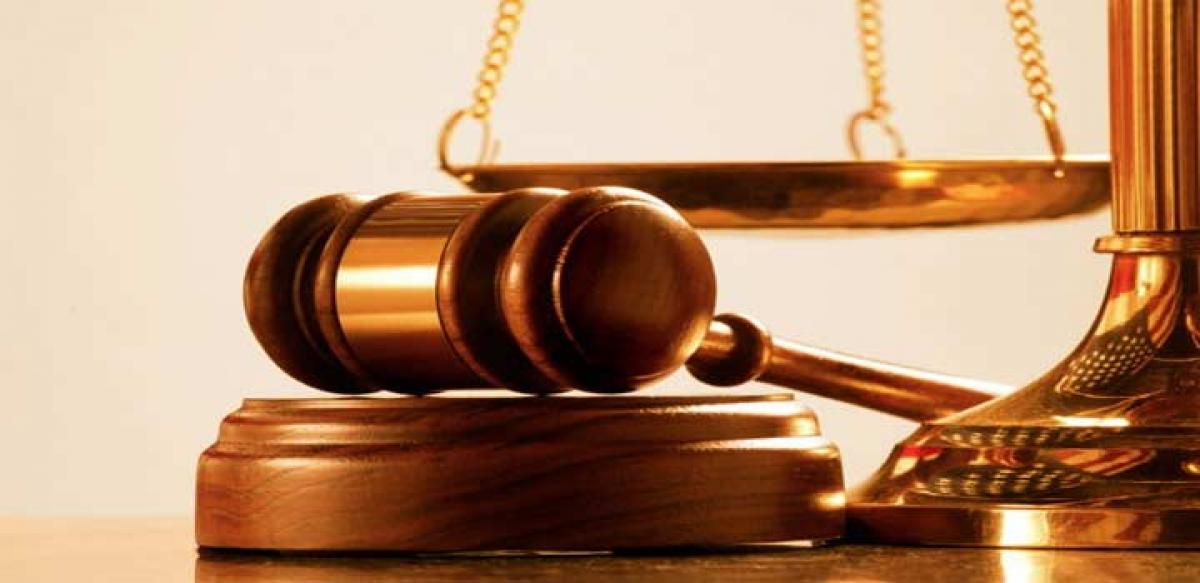Live
- Chevireddy Mohit Reddy's Nomination Process Evokes Massive Support in Chandragiri Constituency
- Bangalore Central: PC Mohan vs Mansoor Ali Khan
- Three key strategies for parents to sail through the turbulent waters of adolescence
- JSP candidate Tangella files nomination papers
- And now for the people’s verdict…
- Key leaders of the Bharatiya Janata Party meet with TDP Chief Nara Chandrababu Naidu
- Apple Unveils OpenELM AI Models for On-Device Tasks: Details
- Actress Sahithi Dasari steps into politics, contesting as an independent candidate from Chevella Constituency
- Vijayawada: 58 nominations filed in NTR district
- Prabhas Donates Rs 35 Lakh to Support Telugu Film Directors Association
Just In

Play clear with the will. Testamentary rights constitute a large chunk of litigation. Even the layman desires that members of his family do not end up in litigation after death.
Testamentary rights constitute a large chunk of litigation. Even the layman desires that members of his family do not end up in litigation after death. To execute a will is perceived as a safe insurance against long drawn battles among siblings or the kith and kin. However, a will, not withstanding, litigation sometimes becomes inevitable.
.jpg)
Take for instance the case where the scion of a business house willed his all to his secretary to the exclusion of even his spouse. Such seemingly ‘unnatural’ wills are often subject matter of litigation.
In a judgement delivered at the cusp of his retirement, Justice KC Bhanu in a bench with Justice M Seetharam Murthy ruled, “A will has to be proved like any other document except as to the special requirements of attestation.”
He set out a series of requirements. While doing so, he made clear, “Proof with mathematical certainty is not expected and the test to be applied would be usual test of the satisfaction of the prudent mind.”
His enlisted tests include, “The pounder would be called upon to show by disinterested, satisfactory and sufficient evidence that the will was signed by the testator, that the testator at the relevant time was in a sound and disposing state of mind free from all extraneous influences, that he understood the nature and effect of the dispositions and put his signature to the document of his own of his own free will and that he had signed it in the presence of two witnesses who attested in his presence and the presence of each other.”
“The onus on the propounder to prove the due and valid execution of the will can be taken to be discharged on proof of the essential facts”. It is often pleaded against the beneficiary of a will that the exclusion of certain expected beneficiaries is unnatural or the recipient of a large chunk is because of ‘coercion or undue influence’.
The bench therefore pointed out, “The exclusion of the will may be surrounded by suspicious circumstances like the signature of the testator may be very shaky and doubtful or not appear to be his usual signature. The condition of the testator’s mind may be very feeble debilitated.
The disposition made in the will may be unnatural, improbable or unfair in the light of relevant circumstances like exclusion of or absence of adequate provision for the natural heirs without reasons. The dispositions may not appear to be the result of the testator’s free will and mind.
The propounder takes a prominent part in the execution of the will conferring substantial benefit on him. The testator used to sign blank sign papers. The will did not see the light of the day for long. Incorrect recitals of essential facts. The unregistered will challenged as forged comes from the custody of major beneficiary.
Justice Seetharama Murthy speaking for the bench said “What circumstances would be regarded as suspicious cannot be precisely defined or exhaustively enumerated and that inevitably would be a question of fact in each case. Each and every circumstance is not a suspicious circumstance and a circumstance would be suspicious when it is not normal or is not normally expected in a normal situation or is not expected of a normal person.”
Stating the obvious, the bench made it clear that the testator has the freedom to give his property to whomsoever he likes and once it is established that the testator was free and had a sound disposing mind, it is no longer the duty of the court to go further to inject its own ethics of what is or is not a moral or a fair disposition according to its own standard but added that allegations of exercise of undue influence, fraud or coercion in respect of the execution of the will propounded have to be proved by the person making such allegations.
Circumstantial evidence to prove the signature of the testator can lead to a legitimate conclusion only if it leads irresistibly to the inference that the person must have signed the document in question, but the presumption of execution of the will by the testator on proof of the signature may be rebutted by proof of suspicious and unnatural circumstances.
“The registration of the will by the testator will be a strong circumstance to support the genuineness of the will, but will not by itself be sufficient to dispel all suspicion without subjecting the evidence of registration to a close scrutiny,” Justice Seetharama Murthy clarified. The judgement would hopefully take a clearer path on execution of wills and establish them in courts.
By L Ravichander

© 2024 Hyderabad Media House Limited/The Hans India. All rights reserved. Powered by hocalwire.com







